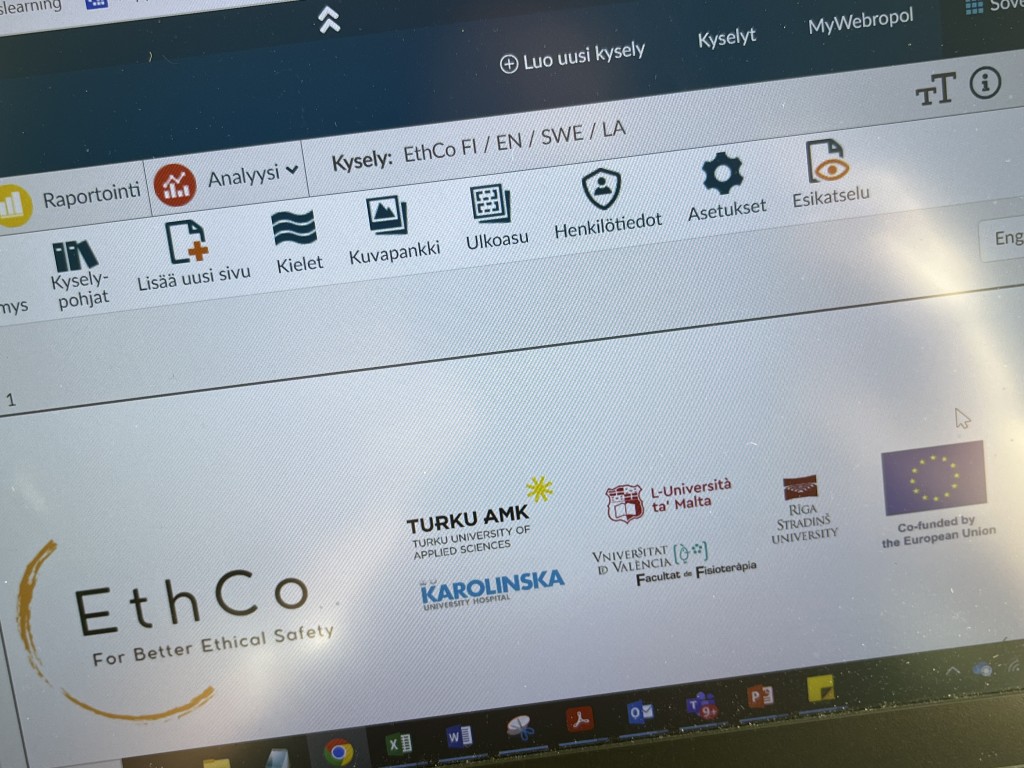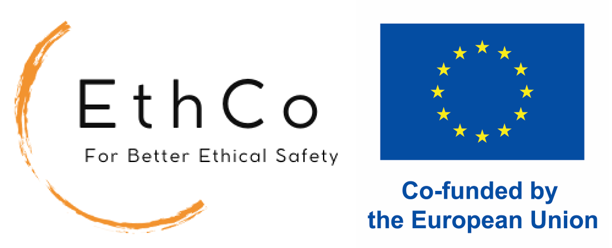Towards better understanding of ethical safety

As part of the EthCo Erasmus+ project, the international and interdisciplinary team engaged in the process of collecting data through a questionnaire as part of Work Package 2. The aim was to have a closer look at our project’s key concepts, ethical safety, ethical climate and moral distress, at the associated partner hospitals. This blog text highlights the process of developing this survey and discusses some of the challenges encountered.
As an Erasmus project organisations and educators collaborate, exchange ideas and learn from each other. One of the most exciting aspects of Erasmus+ is in fact this international collaboration. Creating a questionnaire that can be disseminated in different countries was deemed to be an effective way in gathering insight from all project partners and understanding how different healthcare entities experience ethics in healthcare environments.
The first phase of this work package was creating a team of people who will pursue this task. A representative from each partner country volunteered to participate in this phase and meetings were held in this sub group on a regular basis. The skills and competencies for each individual within this team were also discussed. This provided good insight regarding the different experiences that each team member has and their strengths in relation to this specific research method.
In the first meetings, we clarified and defined the purpose of the questionnaire. This process provided a clear understanding of why the questionnaire is being conducted in relation to the overall EthCo project. The aim of gathering this data was to understand the challenges that healthcare professionals face in relation to the climates that they work in and understand moral distress within these entities. This will help the EthCo team create targeted educational material and substantiate the need for project deliverables. This was followed by the development of research questions which started off as broad questions and were subsequently developed into clearer and more succinct versions.
The next challenge was identifying a target audience. This was discussed at length, in view of the possibility of collecting data from students, different professions and academics. We decided that only healthcare professionals that are nurses and physiotherapists will be included, as the aim of this project is to create educational material in relation to these professions. This ensured that the data collected from the questionnaire is relevant to the research question.
A variety of tools were reviewed in order to determine which tools would best answer the research question. The major challenge of this phase is the different languages and versions of data collection questionnaires. This took longer than expected due to the need for these tools to be translated into four different languages (English, Latvian, Swedish and Finnish). The process of translation does not only concern language, however tools have to be contextual and culturally sensitive. One of the discussions in the group was about the concept of ‘care’ and how this is interpreted by different professions and different cultures.
Prior to launching the survey, we tested it with a small group of respondents in order to ensure that questions were clear, concise and unbiased. Adjustments to the questionnaire were done based on this feedback.
Furthermore, this project required ethical approval from the different entities within the respective countries. This resulted in different requirements between one country and another, resulting in a slight shift in timelines. A further challenge was to determine the ideal online platform for questionnaire dissemination. This was determined based on the ease of access, support available and versatility of the tool in relation to survey creation. This questionnaire development has brought up several challenges along the way, however it also provided a voice to all partners during the survey process.
In May 2023, the questionnaire went live and we are now in the process of data collection. We are very excited to kick start the process of data analysis in an attempt to understand moral distress, ethical climates and ethical safety in healthcare environments in different European countries.
Original instruments from:
Ethical safety: Poikkeus T, Suhonen R, Katajisto J, Leino-Kilpi H. Relationships between organizational and individual support, nurses’ ethical competence, ethical safety, and work satisfaction. Health Care Manage Rev. 2020 Jan/Mar;45(1):83-93.
Moral distress: Epstein, Whitehead, Prompahakul, Thacker, & Hamric (2019). Enhancing Understanding of Moral Distress: The Measure of Moral Distress for Health Care Professionals, AJOB Empirical Bioethics 10(2): 113-124.
Ethical climate: Grönlund CF, Söderberg A, Dahlqvist V, Andersson L, Isaksson U. Development, validity and reliability testing the Swedish Ethical Climate Questionnaire. Nursing Ethics. 2019;26(7-8):2482-2493. doi:10.1177/0969733018819122
Authors:
Adrienne Grech, University of Malta
Kati Naamanka, Turku University of Applied Sciences
